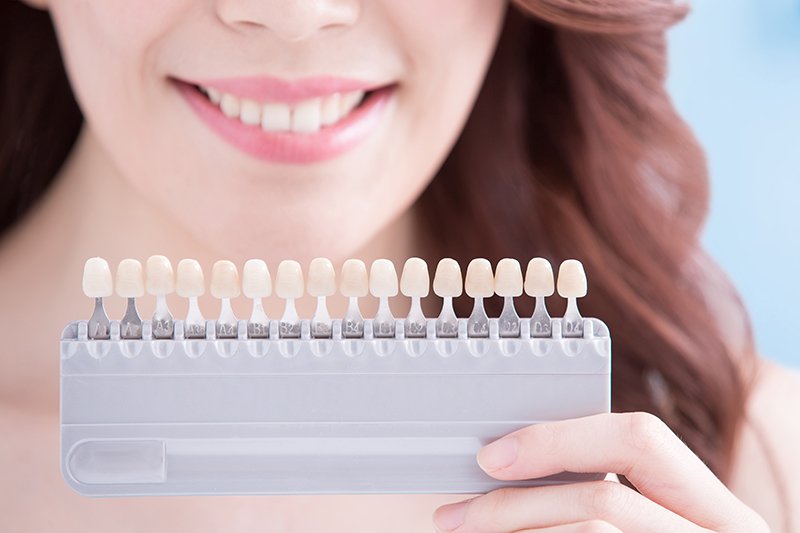
In a world filled with whitening toothpastes and drugstore whitening kits, it’s important to know that the most effective teeth whitening treatment still comes from your dentist. Not only do dentists have more powerful tools at our disposal, we are also experts on your smile, and can tell you whether teeth whitening is right for you and what kind of results to expect.
To understand how to whiten teeth as effectively as possible, let’s start with a little science.
If you look at teeth under a microscope, you can see that the hard outer layer, called enamel, is made up of a tightly packed crystal structure called rods. While this layer seems solid and smooth to the naked eye, it’s possible for the molecules that cause stains to get deep into the enamel by seeping between the rods. In order to remove stains, dentists use a chemical that can get down to where the stains are and break up them up using a chemical reaction.
The chemicals used in professional teeth whitening are hydrogen peroxide and carbamide peroxide (which breaks down into hydrogen peroxide in your mouth, so hydrogen peroxide is still the active ingredient). Hydrogen peroxide penetrates the teeth and causes a reaction called oxidation, which breaks down the stain compounds.
By the way, whitening toothpastes work by removing surface stains on teeth, not the ones under the surface. They do this by being more abrasive than other toothpastes, which is why your dentist may discourage you from using whitening toothpastes if you have complained of tooth sensitivity. More than anything, toothpastes are good for preventing stains, not removing them!
At-home teeth whitening products from the drugstore also contain carbamide or hydrogen peroxide, but in much lower concentrations. They also contain other ingredients for flavor and to help reduce the possibility of tooth sensitivity. While drugstore kits are much cheaper, because the bleaching agents in these kits are less potent, you can expect to see results in weeks as opposed to days (with a home kit from your dentist) or minutes (when you get your teeth bleached at the dentist).
Another reason that it’s a good idea to go to you dentist for whitening treatments is they can evaluate whether your teeth should even undergo whitening to begin with. Some people don’t realize that whitening only works on natural teeth. Fillings and crowns are made of artificial materials that look like teeth, and feel like teeth, but chemically speaking, they’re very different. Most restorations are made from ceramic, porcelain, or composite resin. These materials do not react the same way to bleaching chemicals as your natural tooth enamel does. If you have large fillings or crowns, a dentist can recommend alternatives to bleaching for improving the appearance of your smile.
Appointments Before & After Work or School & on Saturdays & Sundays!
Request Online or Call Today!
Related Posts
Counterproductive Brushing Habits & Fixes
If you brush your teeth at least twice a day, you’re doing great. Regular brushing is the key to preventing tooth pain & expensive procedures.
Solutions for Slowing Sensitivity in Teeth
As our teeth are exposed to more & more foods that wear away enamel, our teeth can become sensitive to things like hot & cold food & drink.
Teaching Your Child Good Dental Habits
Good dental habits like brushing your teeth are important for your oral & overall health, but to kids, they can feel like a chore. Even though baby teeth will fall out eventually, it’s important to keep them healthy because they are guides & space holders for permanent teeth. Here are some tips for teaching your kids good dental hygiene habits to solidify their oral health for a lifetime.



